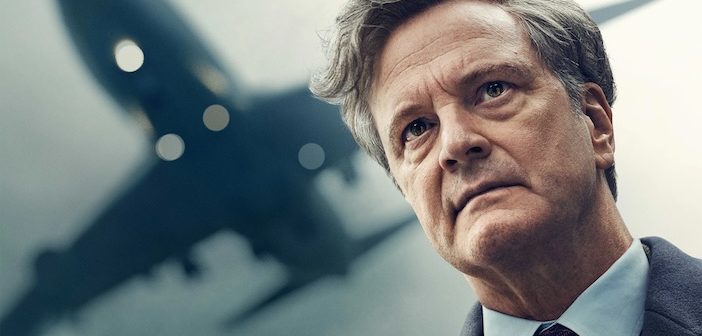As January seems to be the prime time for event drama on the small screen, the Arb’s ‘on screen’ critic, TV director Paul Joyce, takes a look at how modern historical events make for ripe material through the lens of Sky’s latest and a recent standard bearer of the genre…
One thing the post office scandal did was to single-handedly revive the taste for what they call in my crazy business, a ‘drama-doc’. Not that most thick-eared TV executives realised this until the viewing figures rocketed, but now you can’t get enough of them. The Staircase, Amy, Pumping Iron, and so on, right down to 24 Hours in A&E (who on earth wants to watch that, I wonder?). This specific genre seems to be with us now on an ongoing basis, with notions of budgets and, ultimate, duration being tossed out of multi-storied windows.
So, embracing this as critic, I’d like to take a couple of examples of outstanding drama-documentaries and how this particular genre has established itself as a staple of contemporary television output. We have Lockerbie: A Search for Truth and, from a few years ago now, what I consider to be THE outstanding historical reconstruction: Chernobyl. It makes Oppenheimer look like an episode of Playschool. Seriously, this was basically a feature film in all but length. With actors of truly international quality and with a reconstruction of the blasted Chernobyl landscape as good and convincing as anything I have seen, this stands for me as a yardstick from the streaming services.
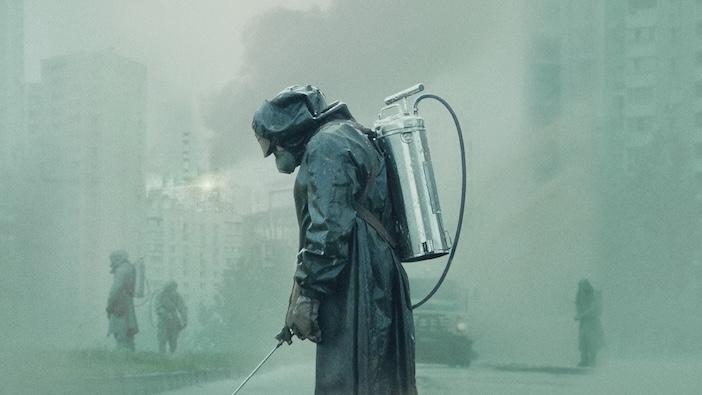
I am comparing this with Lockerbie as they share a number of common tropes: a dogged male investigator, a preventable and monumental disaster, cover-ups and political mendacities. However, in one very important respect (at least as far as a faithful audience is concerned) the two part company with a rending as confused and noisy as the Lockerbie crash itself.
It seems to me that the main difference between, say, a feature film version of this air disaster, and one financed and executed by a streaming service, spins around the question of casting. Lockerbie as a film would have international stars in support of Firth, as opposed to a TV version boasting just highly competent and probably better (in their roles at least) actors.
Also, I was stunned by the quality of locations, particularly the Libyan ones, where Firth goes to actually meet with Gaddafi. The sumptuous presidential palace could not have looked more opulent or well cared for. I have worked in the Production Design department (as assistant to Dean Tavoularis, Oscar-winner for The Godfather series) on a remake of The Parent Trap, and I know how difficult – and expensive – such lookalike locations can be, and not just to find, but to use and inhabit. So, in that respect, I see no difference in effort and execution between the two potential content producers.
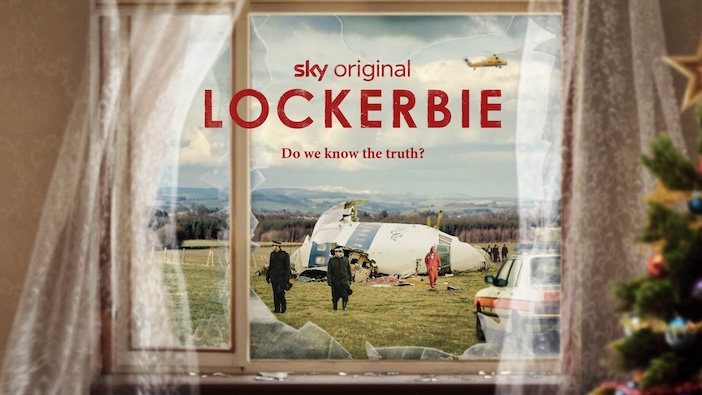
Here, though, I have to confess to binge watching Lockerbie well beyond the midnight hour, travelling in a mighty arc taking in martinis, supper, coffee and chocolates (left over from Christmas) and much red wine, from episode two to the end, which I supposed would constitute the standard six episodes. But with what I thought would be half the story of what actually happened on Pan Am Flight 103 in parts 1-5, surely episode 6 would pack all the rest of the story in a concentrated, dramatic and exciting form?
Not on your life. The credits sped upwards with a tiny roller caption – don’t they realise not everyone has 65” Oled TV? – stating that, nearly 40 years on, we are still no closer to knowing who the perpetrators were of the suitcase bomb which brought it down. What we got was nevertheless an exciting, rigged trial against the principal suspect but with the most important evidence (not just to free him, but to implicate the actual suspects) locked in a time vault of the government choosing under The Official Secrets Act. So, no real drama, no real climax, just a polite disclaimer – and maybe we can film the rest in 25 years’ time.
Turning now to Chernobyl, where the climax was devastating for literally everyone concerned, rivalling even the best of courtroom dramas, such as Sidney Lumet’s Twelve Angry Men. Finally, a Soviet cover-up for reasons of incompetence, chicanery, bribery, murder of thousands of people which now has actually got international exposure, thank you HBO. If you haven’t seen it, dial it up now. The cast is superb, with Jared Harris giving a performance of exquisite subtlety, and Emily Watson just being, well, great; but the atomic gong goes to Stellan Skarsgard as the Russian official who turns on his corrupt communist masters and rips the whole tissue of government lies and cover-ups to shreds. It is, simply, unmissable.
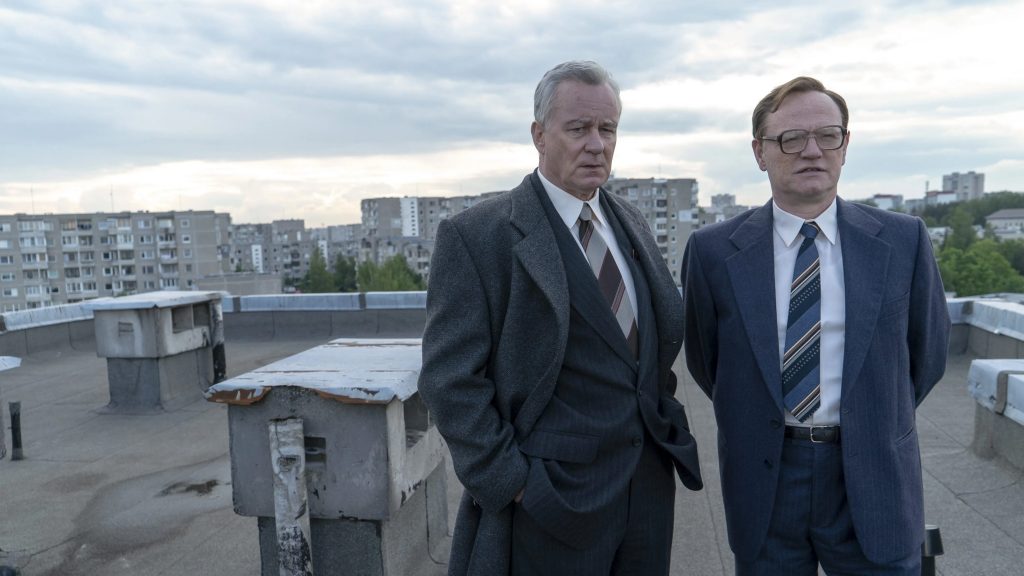
The main problem, therefore, is that in the case of Lockerbie they had a great beginning, watchable middle, but no ending. They tried to compensate for this by extending the trial of the chief suspect, but that just left us wanting even more acutely to reach some kind of practical resolution as to who actually planted the suitcase bomb. As a drama director myself it seemed they missed the very nub of a much more interesting story, namely the succession of government cover-ups uniting both major political parties and people still well alive today (think Davids Cameron and Miliband).
Briefly, our government(s) wanted Libya to take sole responsibility for the bomb, where it was clear to all concerned, including the CIA and FBI, that Libya’s connection to the tragedy was tenuous indeed. Clear to all, but unmentionable, was the fact of Iran’s responsibility for smuggling the bomb onboard that fateful flight, in concert with a follow terrorist group, the PLFP-GC. But the US needed to remain on reasonable terms with Iran (so, indeed, did we) so the matter was essentially buried and an innocent man placed (knowingly) on trial. The issue was further complicated by the fact we, and a whole gang of European countries, still needed large quantities of Libyan oil.
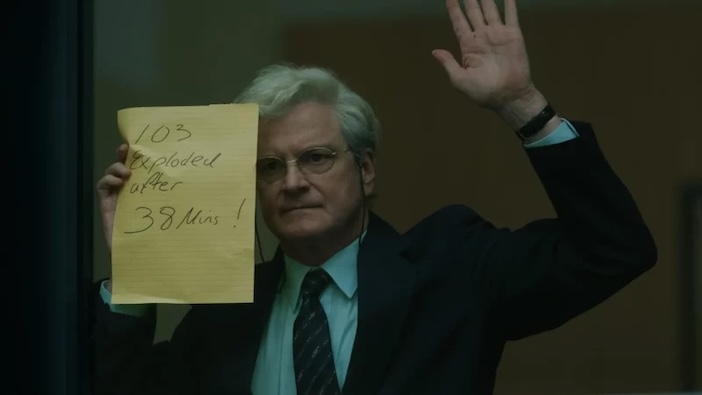
Given these reservations I do recommend a viewing of all five episodes, just bear in mind that the journey is all, and the destination, like a Butlins Holiday Camp on a wet summer’s day, somewhat of a let-down. However, Colin Firth’s recreation of the Lockerbie GP, Jim Swire, who became the spokesperson for the family survivors, is truly remarkable and extremely moving. But the wild card who finally helps justify the full five episodes, is Ardalan Esmali who recreates Abdelbaset al-Megrahi, giving an apparently cold-blooded killer a terrific depth of character, making us doubt the whole reason for the trial.
In one tear-jerking scene, when Firth manages an extremely dangerous trip to Libya to visit al-Megrahi, who is dying of prostate cancer, the Libyan says he will make sure of greeting Firth’s daughter when he gets to heaven. A friendship forged in the fire of burning engine fuel, one crossing religious and cultural and political boundaries, the only glimpse of hope in a basically hopeless tale.
Ultimately, we are all just pawns on a chessboard, traduced by politicians who seemed to be acting in our best interests, but who all placed country before people. In the words of E.M Forster, “If I had to choose between betraying my country and betraying my friend, I hope I should have the guts to betray my country.” Hear hear, to that sentiment.
Lockerbie: A Search for Truth is currently available on Sky, Chernobyl is available on HBO. Both series are streaming on NowTV.
Images courtesy of SkyTV and HBO

